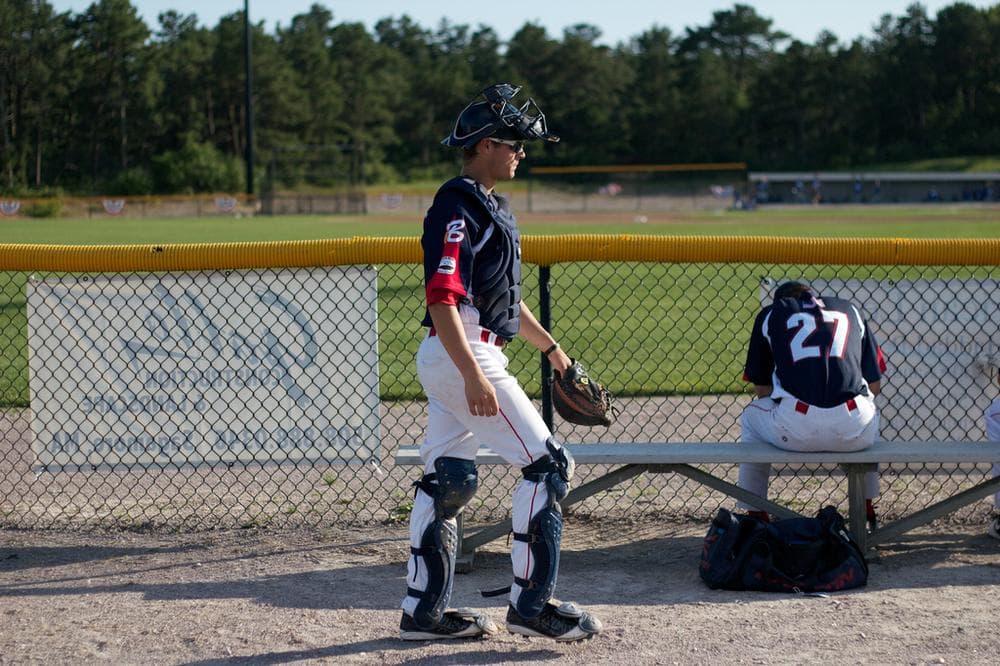Advertisement
'Shoeless' Joe's Namesake Steps Up To The Plate

This month marks the 125th birthday of one of the greatest and most controversial players in baseball history: Shoeless Joe Jackson. Shoeless Joe’s story is one of rare talent. But he’s best remembered for his role in the 1919 Black Sox Scandal, and for his subsequent banishment from baseball. But, if one aspiring ballplayer in this summer's Cape Cod League has his way, that will soon change.
This story was originally featured on WBUR's Only a Game.
It was a warm July evening, and the Bourne Braves of the Cape Cod Baseball League were playing the Falmouth Commodores. Bourne’s catcher, a 6-foot-1, 200-pound sophomore armed with his shinguards, a helmet and sunglasses, stepped out of the dugout and onto the field. When his name was announced, it sent a ripple through the crowd.
“… number 21, Joe Jackson…”
“People, they’ll look at the roster and then they see ‘Joe Jackson’ and they’re just like, ‘Oh, that’s pretty funny, that’s a good name,’” Jackson said. “And then kids on the team they’re like, ‘Hey, Shoeless!’ and they’re just joking around and you tell them for real, that you’re related to him, and they’re like, ‘Shut up. You’re not.’ I was like, ‘No, I really am.’”
This Joe Jackson happens to be the great-great-great nephew of “Shoeless“ Joe Jackson. Right now, this Joe Jackson is among the best college baseball players in the country. He’s usually found behind the plate catching for The Citadel. But this summer, he’s in the Cape Cod Baseball League chasing his dream of one day playing in the major leagues and of restoring the name “Joe Jackson” to baseball’s good graces.
The dream started back in Greenville, S.C.
“I played for the Marlins,” Jackson said. “And I mean, obviously it’s t-ball, so it’s not like you’re going to win or lose really, but I was so excited to get out there on the field and wear my uniform and I always loved baseball after that.”
Shoeless Joe also grew up in Greenville. He started playing for the Brandon Mill baseball team, where he worked, when he was only 13. Some of the similarities between the two are striking. At Joe’s parents’ house, there are side by side photos of the two Joes. They look almost identical.
“Everything is exactly the same except for our hands,” Jackson said. “His were a little lower than mine. Our load is the same, our weight distribution, how I stride with my foot, things like that. Everything is exactly the same except for the hands and it’s kind of eerie to look at.”
There are, of course, differences: Shoeless Joe played left field, while Joe is a catcher. Joe is currently in college, and Shoeless Joe was illiterate. And then there’s the scandal, which cost Shoeless Joe his career.
“He was banned from baseball in 1920, I believe, for throwing the 1919 World Series,” Jackson said. “He was acquitted in the court of law and was still banned from the game by the commissioner. I believe he had a few assists from the outfield, hit the series’s only home run, had the highest batting average in the series, and still got banned. So take it for what it’s worth, but I don’t think he did it.”
The grand jury did clear the players of any criminal wrongdoing because, at the time, it wasn’t illegal to purposely lose baseball games. But the baseball commissioner, Kenesaw Mountain Landis, wasn’t quite so lenient. He banned Shoeless Joe and his seven teammates for life.
Shoeless Joe said that he never threw a baseball game, and his stats from that series seem to back him up on this. But he still took the $5,000 that he was offered. So for more than 90 years, the questions have persisted: Was Shoeless Joe involved in the fix? Did he participate in throwing the World Series? In the Jackson family, the answers are clear.
“One other thing he told the family for sure is that he didn’t do it,” Jackson said. “Usually you don’t lie to family, especially in my family, so I believe he’s innocent and that’s pretty much the story.”
Shoeless Joe went back to Greenville, where generations of Jacksons have lived and played baseball.
“I mean, he was such a big part of baseball for good and bad reasons,” Jackson said. “Back then, it was the pastime and he was a really good player, and people still remember it to this day and it’s just neat to be like related to somebody like that even if I didn’t know him.”
Shoeless Joe is a part of the family, and Joe is proud of where he comes from. But once he is on the field, he doesn’t really think about it.
“I don’t really feel that much pressure or anything,” Jackson said. “I just go out and play. But, I just want to be a good player myself, maybe restore the family name one day in Major League Baseball.”
I asked Joe what it would take to restore that name.
“Just to be a good person all around,” he said. “Having a good name for myself throughout my career on and off the field.”
In the bottom of the 2nd inning against Falmouth, Joe Jackson stepped up to the plate. He doubled as major league scouts looked on. Like everyone else in the Cape Cod League, Joe Jackson is trying to make a name for himself. But unlike the rest of the players, Joe Jackson’s name is already a part of baseball history.
This segment aired on July 26, 2012. The audio for this segment is not available.